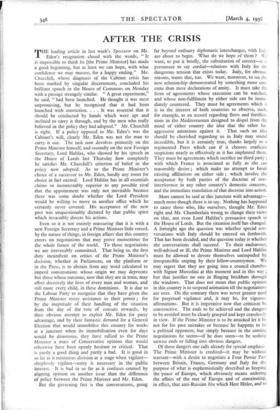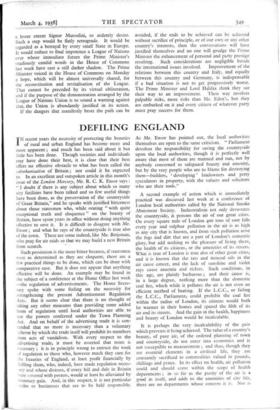AFTER THE CRISIS
THE leading article in last week's Spectator on Mr. Eden's resignation closed with the words, " It is impossible to think he [the Prime Minister] has made a good beginning, but at least we can hope, with what confidence we may muster, for a happy ending." Mr. Churchill, whose diagnosis of the Cabinet crisis has been marked by singular discernment, concluded his brilliant speech in the House of Commons on Monday with a passage strangely similar. " A great experiment," he said, " had been launched. He thought it was most unpromising, but he recognised that it had been launched with conviction. . . . It was essential that it should be conducted by hands which were apt and inclined to carry it through, and by the men who really believed in the policy they had adopted." Mr. Churchill is right. If a policy opposed to Mr. Eden's was the Cabinet's will, clearly Mr. Eden was not the man to carry it out. The task now devolves primarily on the Prime Minister himself, and secondly on the new Foreign Secretary, Lord Halifax, who showed by his speech in the House of Lords last Thursday how completely he satisfies Mr. Churchill's criterion of belief in the policy now adopted. As to the Prime Minister's choice of a successor to Mr. Eden, hardly any room for choice in fact existed. Lord Halifax has in all essentials claims so incontestably superior to any possible rival that the appointment was only not inevitable because there was some doubt whether the Lord President would be willing to move to another office which he certainly never coveted. His acceptance of the new post was unquestionably dictated by that public spirit which in variably directs his actions.
Even so it is not entirely reassuring that it is with a new Foreign Secretary and a Prime Minister little versed, by the nature of things, in foreign affairs that this country enters on negotiations that may prove momentous for the whole future of the world. To those negotiations we are irrevocably committed. That being so, the first duty incumbent on critics of the Prime Minister's decision, whether in Parliament, on the platform or in the Press, is to abstain from any word calculated to imperil conversations whose origin we may deprecate but those whose outcome, now that they are in train, may affect decisively the lives of every man and woman, and still more every child, in these dominions. It is due to the Labour Party to recognise that they have given the Prime Minister every assistance in their power ; for by the ineptitude of their handling of the situation from the day of the vote of censure onwards, • by their obvious attempt to exploit Mr. Eden for party advantage, and by their fantastic demand for a General Election that would immobilise this country for weeks at a juncture when its immobilisation even for days would be disastrous, they have rallied to the Prime Minister a mass of Conservative opinion that would otherwise have been openly hesitant or critical. That is partly a good thing and partly a bad. It is good in so far as it minimises division at a stage when vigilant— sleeplessly vigilant—unity is necessary in the public interest. It is bad in so far as it confuses counsel by aligning opinion on another issue than the difference of policy between the Prime Minister and Mr. Eden. But the governing fact is that conversations, going far beyond ordinary diplomatic interchanges, with Ital: are about to begin. What do we hope of them ? We want, to put it briefly, the substitution of correct—it is premature to say cordial—relations with Italy for the dangerous tension that exists today. Italy, for obvious reasons, wants that, too. We want, moreover, to see the new relationship demonstrated by something more con- crete than mere declarations of amity. It must take the form of agreements whose execution can be watched, and whose non-fulfilment by either side can be imme- diately countered. They must be agreements which it is to the interest of both countries to observe, such, for example, as an accord regarding fleets and fortifica- tions in the Mediterranean designed to dispel from the mind of either country the idea that the other has aggressive attentions against it. That such an idea should be cherished regarding us in Italy may sound incredible, but it is certainly true, thanks largely to a regimented Press which can if it chooses eradicate suspicions nearly as effectively as it has implanted them. They must be agreements which sacrifice no third party ; with which France is associated as fully as she can reasonably desire ; which make no attempt to break existing affiliations on either side ; which involve the acceptance by both parties of the doctrine of non- interference in any other country's domestic concerns, and the immediate translation of that doctrine into action.
More cannot be said at this juncture with advantage— much more though there is to say. Nothing has happened to cause those who, like ourselves, thought Mr. Eden right and Mr. Chamberlain wrong to change their views on that, not even Lord Halifax's persuasive speech in the House of Lords. But the situation itself has changed. A fortnight ago the question was whether special con- versations with Italy should be entered on forthwith. That has been decided, and the question today is whether the conversations shall succeed. To their endeavour, well-advised or ill, the Prime Minister and Lord Halifax must be allowed to devote themselves unimpeded by irresponsible sniping by their fellow-countrymen. We may regret that they are going into a council chamber with Signor Mussolini at this moment and in this way ; but that justifies no one in flinging brickbats through the windows. That does not mean that public opinion in this country is to suspend animation till the negotiations are over. On the contrary there was never greater need for perpetual vigilance and, it may be, for vigorous affirmations. But it is imperative now that criticism be constructive. The ends to be achieved and the dangers to be avoided must be clearly grasped and kept ceaselessly in view. If the Prime Minister is to be attacked let it be not for his past mistakes or because he happens to be a political opponent, but simply because in the coming negotiations he seems—if he does seem—to be seeking unwise ends or falling into obvious dangers.
Of those dangers one calls already for special emphasis. The Prime Minister is credited—it may be without warrant—with a desire to negotiate a Four Power Pact between Britain, France, Germany and Italy for the purpose of what is euphemistically described as keeping the peace of Europe, which obviously means ordering the affairs of the rest of Europe and of constituting, in effect, that anti-Russian bloc which Herr Hitler, and to a lesser extent Signor Mussolini, so ardently desire. Such a step would be flatly retrograde. It would be regarded as a betrayal by every small State in Europe. It would reduce to final impotence a League of Nations over whose immediate future the Prime Minister's studiously candid words in the House of Commons last week have cast a still darker shadow. The Prime Minister voiced in the House of Commons on Monday a hope, which will be almost universally shared, for the reconstitution and revitalisation of the League. That cannot be preceded by its virtual obliteration, and if the purpose of the demonstration arranged by the League of Nations Union is to 'sound a warning against that, the Union is abundantly justified in its action.
If the dangers that manifestly beset the path can be avoided, if the ends to be achieved can be achieved without sacrifice of principle, or of our own or any other country's interests, then the conversations will have justified themselves and no one will grudge the Prime Minister the enhancement of personal and party prestige resulting. Such considerations are negligible beside the international issues involved. Improvement of the relations between this country and Italy, and equally between this country and Germany, is indispensable if a bad situation is not to get progressively worse. The Prime Minister and Lord Halifax think they see their way to an improvement. Their way involves palpable risks, more risks than Mr. Eden's, but they are embarked on it and every citizen of whatever party must pray success for them.







































































 Previous page
Previous page